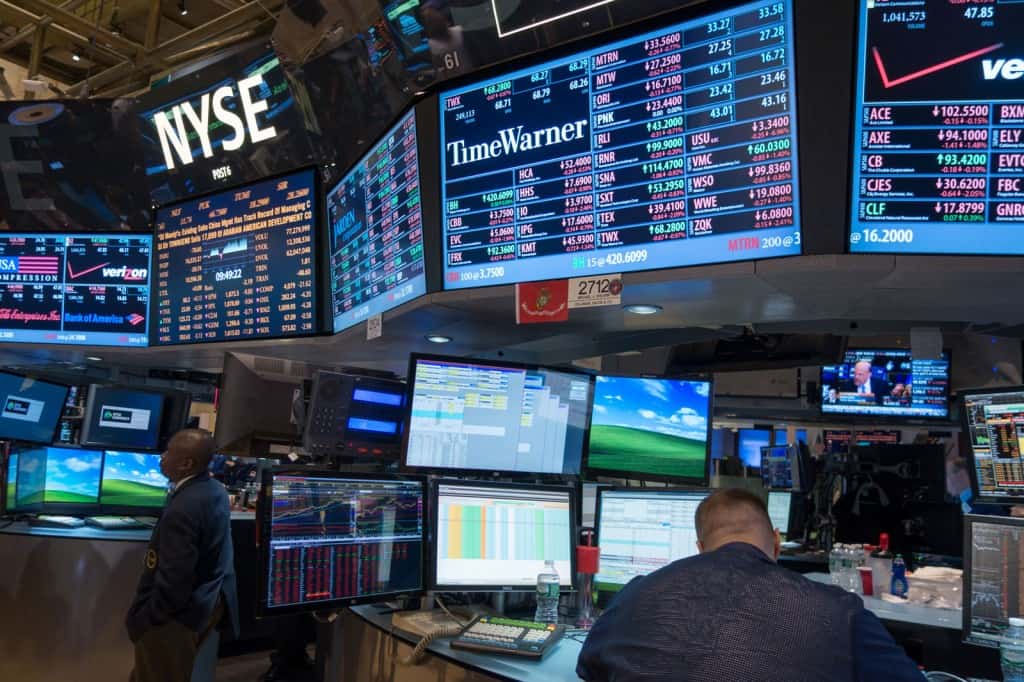
U.S. stocks are seeing their biggest decline in months, pulled down by hefty losses in health care and technology companies.
The Standard & Poor’s 500 index fell 31 points, or 1.1 percent, to close at 2,822. The Dow Jones industrial sank 363 points, following a 145 point slump on Monday, to end at 26,077. The Nasdaq lost 64 points, or 0.9 percent, to 7,402.
Stocks also slumped on Monday. The market’s last two-day losing streak was in late December. The VIX, a measure of how much volatility investors expect in stocks, was up 4.8 percent, its highest level since August.
“Is it profit-taking? Probably a little bit of that,” said Phil Blancato, CEO of Ladenburg Thalmann Asset Management. “There’s too much positive economic momentum going on right now, but certainly two significant down days makes you wonder if there’s something else going on that we’re not recognizing.”
Financial and industrial stocks also accounted for a big slice of the decline. Energy companies fell as crude oil prices headed lower. The broad slide put the stock market on course for its first two-day losing streak in more than a month.
The stock market got off to a fast start in 2018, with the Dow quickly vaulting to new milestones and other indexes also setting all-time highs. But that momentum stalled last week amid investor unease over the Trump administration’s push for more favorable trade terms with key economic partners.
Health care sector companies slumped on news that Amazon is teaming up with Warren Buffett’s Berkshire Hathaway and JPMorgan Chase to create a company that helps their U.S. employees find quality care at a reasonable cost. The venture, whose initial focus would be on developing technology, is in its early planning stage. Express Scripts tumbled $5.71, or 7 percent, to $76.21. Cigna slid $12.91, or 5.8 percent, to $210.99. UnitedHealth Group lost $8.19, or 3.3 percent, to $239.22.
The partnership between the three corporate giants “could be disruptive and create further competitive pressure on CVS, Walgreens and pharmacy benefit managers, as there hasn’t been a new competitor with this magnitude of resources in the employee health care space for a very long time,” Moody’s analyst Mickey Chadha said in a statement.
The sell-off comes during a week with no shortage of potential market-moving corporate news and economic data. Several big-name companies are due to report quarterly results on Wednesday and Thursday, including Apple, Amazon, Microsoft, Facebook and Google’s parent company Alphabet.
Also on investors’ radar: Tuesday night’s State of the Union address and a two-day meeting of the Federal Reserve’s policymaking committee that wraps up Wednesday. Among the issues President Donald Trump is expected to touch on are trade, taxes and immigration.
“We expect [Mr. Trump’s] ‘America First’ policy and fair and reciprocal trade to be themes, and while the possibility of additional protectionist announcements cannot be ruled out, we do not expect Trump to take any actions on NAFTA at this time,” TD Securities analysts said in a note.
The Conference Board said Tuesday its index of consumer confidence rose to 125.4 in January from a revised 123.1 in December. Meanwhile, a national housing index showed that home prices rose a sharply in November, lifted by a shortage of homes on the market.
Bond prices fell. The yield on the 10-year Treasury rose to 2.71 percent from 2.70 percent late Monday.
Benchmark U.S. crude slid $1.19, or 1.8 percent, to $64.37 a barrel on the New York Mercantile Exchange. Brent crude, used to price international oils, dropped 95 cents, or 1.4 percent, to $68.25 a barrel in London.
The dollar, which fell sharply last week, declined to 108.89 yen from 108.94 yen late Monday.
The price of bitcoin fell 7.1 percent to $10,366, according to the tracking site CoinDesk. Bitcoin futures on the Cboe Futures Exchange slid 6.8 percent to $10,410.

